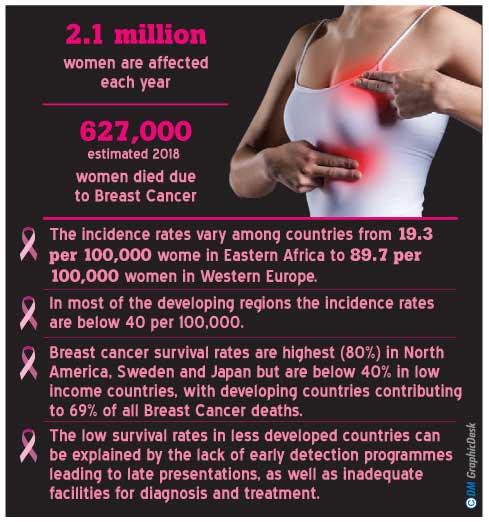Reply To:
Name - Reply Comment
 The world over Breast Cancer is the commonest cancer in women. According to World Health Organisation (WHO) statistics 2.1 million women are affected each year. In 2018 an estimated 627,000 women died due to Breast cancer accounting to 15% all cancer deaths among women. The incidence rates vary among countries from 19.3per 100,000 women in Eastern Africa to 89.7per 100,000 women in Western Europe. In most of the developing regions the incidence rates are below 40 per 100,000. Breast cancer survival rates are the highest (80%) in North America, Sweden and Japan, but are below 40% in low income countries, with developing countries contributing to 69% of all Breast Cancer deaths. The low survival rates in less developed countries can be explained by the lack of early detection programmes leading to late presentations, as well as inadequate facilities for diagnosis and treatment. In Sri Lanka breast cancer is the commonest cancer in women.
The world over Breast Cancer is the commonest cancer in women. According to World Health Organisation (WHO) statistics 2.1 million women are affected each year. In 2018 an estimated 627,000 women died due to Breast cancer accounting to 15% all cancer deaths among women. The incidence rates vary among countries from 19.3per 100,000 women in Eastern Africa to 89.7per 100,000 women in Western Europe. In most of the developing regions the incidence rates are below 40 per 100,000. Breast cancer survival rates are the highest (80%) in North America, Sweden and Japan, but are below 40% in low income countries, with developing countries contributing to 69% of all Breast Cancer deaths. The low survival rates in less developed countries can be explained by the lack of early detection programmes leading to late presentations, as well as inadequate facilities for diagnosis and treatment. In Sri Lanka breast cancer is the commonest cancer in women.

Our incidence has been slowly increasing over the years. According to the National cancer registry 2012, the crude rate of Breast Cancer in women was 28.7 per 100,000 ( age standardized rate 24.3 per 100,000). This is 25% of all Sri Lankan female cancers.When you compare our figure with world statistics, it is quite obvious that breast cancer is 4 - 5 times less common in our country than in the western block.
Looking at the age of diagnosis, breast cancer is the commonest female cancer in Sri Lanka from age 35 years. (around 26.6 per 100,000) on wards. The incidence steadily rises and peaks around 55 years (83.1 per 100,000) with a slow decline thereafter. Over the years the highest incidence age has been slowly shifting up showing more and more older women developing breast cancers in Sri Lanka. This pattern is similar to that seen in western countries. But due to the population structure in our country still around 65- 70 % of affected women are less than 55 years old and are essentially in their pre-retirement age. They are mostly the mothers of schoolgoing children and also do a job to support the family income.
Therefore it is very important to take a closer look at our strategies. The major part of this strategy is early detection.The success story of Sri Lanka’s strategy can be seen by studying the 2009 cancer registry figure where operable breast cancer belonging to stage I or II and detected by us accounts for 63.7% of Sri Lankan breast cancers. This gives a good reflection of effectiveness of our early detection programmes and places us in a much better position than our regional neighbours.
The word breast cancer is generally reserved for “invasive cancers”, which if left alone has the potential to spread. A practice referred to as “Self breast examination” done monthly by examining ones own breasts and arm pit by one self, starting from the age a girl attains puberty, is a good practice to acquire. This is now referred to as “breast awareness”.
The technique is well described and can be found in newspapers, internet “Youtube” videos, breast examination books from all reputed book stores and is also taught by midwives in well women clinics of Sri Lanka. The family practitioners are also versed about this technique and it can be recommended to be taught to ladies of our country from the age of menarche.
This technique helps to detect suspicious lumps which could be a breast cancer especially in women more than 35 years of age. The possibility of it being a cancer increases with age as described earlier. Therefore if a change in the breasts such as lumps, skin changes, nipple discharge or retraction and arm pit lumps are noted after 40-45 years it’s a very good idea to meet your family physician without a delay.
When a woman attends these places a trained examiner such as a doctor will physically examine you ( referred to as “Clinical breast examination” ). The WHO has recommended this technique as a very useful one for developing middle resource countries like ours.
(The writer is a Consultant Oncological Surgeon at the National Cancer Institute, Sri Lanka and the Chairman of the Speciality Board in OncoSurgery, PGIM President -Sri Lanka Association of Surgical Oncologists. He can be reached through Email :[email protected])